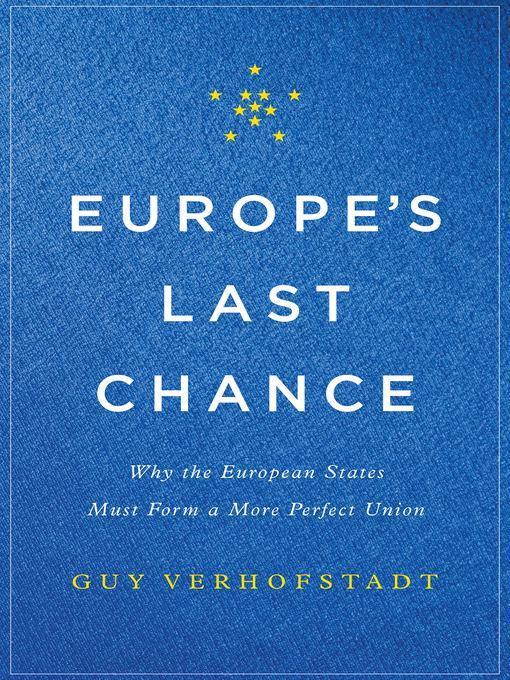
Europe's Last Chance
Why the European States Must Form a More Perfect Union
کتاب های مرتبط
- اطلاعات
- نقد و بررسی
- دیدگاه کاربران
نقد و بررسی

November 28, 2016
Verhofstadt, former prime minister of Belgium, issues a call to action in this thoughtful and well-argued policy primer. Verhofstadt states that Europe is in crisis and “stretched beyond measure” due to various problems: Brexit, an influx of refugees, ISIS, Russia’s aggression, and more. He offers a new vision intended to unite Europe and dispel old nationalisms, which, he states, pose even more danger than these new issues. Europe needs to pull together much as the United States did after discarding the “terribly ineffective” Articles of Confederation in favor of the U.S. Constitution. He see Europe’s only remedy as being the American federal model, stating that a united Europe can better head off terrorism and survive economic downturns. In five sections, respectively entitled “At the Brink,” “Delusion,” “Decay,” “Panic,” and “Rebirth,” Verhofstadt anatomizes Europe’s fractured state. Ultimately, he remains hopeful for a truly united continent that can protect its citizens, remain a valuable American ally, and face future challenges. Impassioned and logically sound, this clearly presented treatise presents an appealing way forward from a troubled present.

November 15, 2016
With the entire European project severely threatened, Belgium's former prime minister offers a prescription to save the European Union.Following the bailout of Greece and Britain's vote to leave the union, amid a boiling refugee crisis and an unprecedented threat of terrorism, the EU's continued survival no longer seems assured. How, then, to save it? A member of the European Parliament since 2009, Verhofstadt (The Financial Crisis--How Europe Can Save the World, 2009, etc.) argues, unsurprisingly, for complete integration along the lines of the American federal model. Few will dispute his analysis of the union's current infirmities: a sluggish economy, a 25 percent youth unemployment rate, low levels of labor mobility, no common budget, a pitifully weak defense community, lax security arrangements, and a common currency unsupported by a true political union. As he addresses these and other issues, the author hits all the predictable notes about transparency and democracy while calling for more streamlined institutions and even a two-tier reorganization (full or associated membership). For the current mess, he faults EU elites for their "quick fix politics" and for attempting a "step-by-step Europe" instead of committing wholeheartedly to union. Mostly, though, he blames those under "the nationalist delusion that still haunts Europe": predatory outsiders like Vladimir Putin; troublemaking insiders like Italy's Silvio Berlusconi, Britain's Tony Blair, and Hungary's Viktor Orban; provocateurs like France's Marine Le Pen and Britain's Nigel Farage. But why gratuitously insult the ghosts of Margaret Thatcher, Charles de Gaulle, even Milton Friedman, serious people all, or more grievously, rudely dismiss the millions of euroskeptics loath to surrender sovereignty to a union whose benefits have yet to outweigh its burdens? Verhofstadt takes a swipe at assuaging their concerns but ultimately rejects these voices as merely xenophobic, crudely populist, or absurdly emotional. His barely concealed contempt for those who have frustrated his cherished project will likely win few converts among a constituency essential for the EU's success.A proper diagnosis, likely some good medicine, delivered with an unfortunate bedside manner.
COPYRIGHT(2016) Kirkus Reviews, ALL RIGHTS RESERVED.

February 1, 2017
Former Belgian prime minister and current president of the Alliance of Liberals and Democrats for Europe Verhofstadt (The United States of Europe) delivers a well-researched call to action in his latest work: to form and fund a new Europe. Verhofstadt hits hard on what he considers to be thee failed and ineffective policies of the European Union that have resulted in weakness: "The union has become patchwork, divided and fragmented by a seemingly endless series of opt-ins, opt-outs, enhanced cooperation agreements, and intergovernmental arrangements." Drawing on his personal experiences as well as a bounty of political and economic research, the author uses the region's history and makes comparisons to economies and political systems of other nations to encourage member states to institute reforms, such as developing a common budget and creating a single digital market, to create a more cohesive Europe. VERDICT Recommended for collections in which titles on European governance and reforms are in demand and circulate well.--Mattie Cook, Lake Odessa Comm. Lib., MI
Copyright 2017 Library Journal, LLC Used with permission.

























دیدگاه کاربران